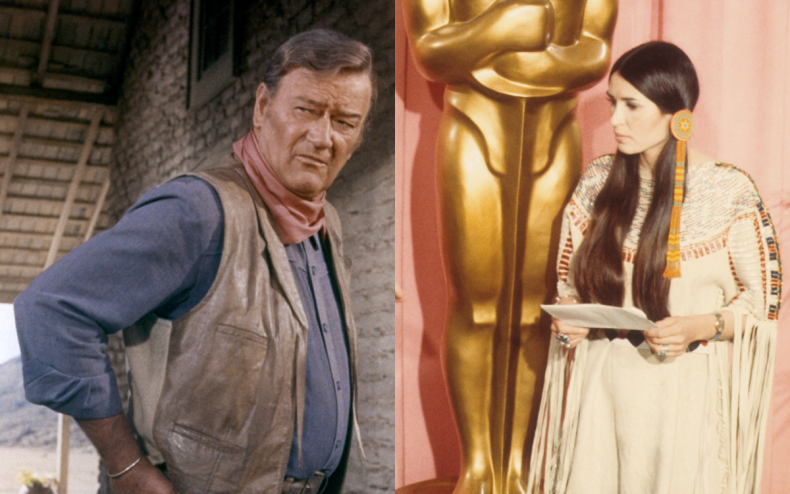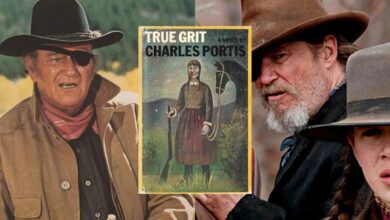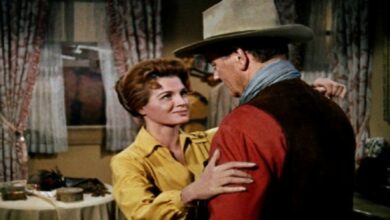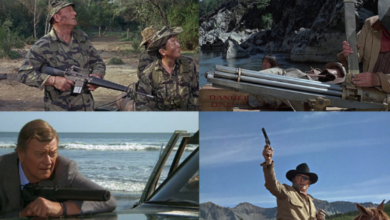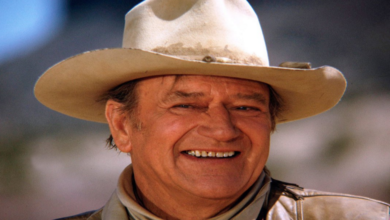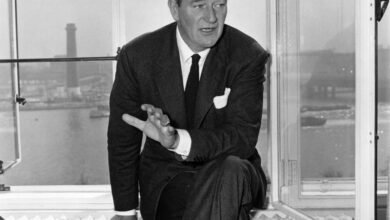John Wayne Trends in Wake of Sacheen Littlefeather Oscars Apology
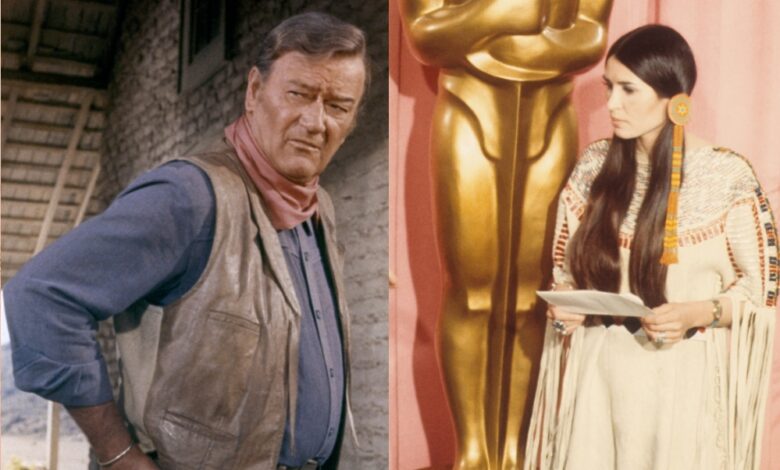
John Wayne’s name began trending on Twitter after the the Academy of Motion Picture Arts and Sciences issued a formal apology to Sacheen Littlefeather over her treatment at the 1973 Oscars.
Littlefeather appeared on stage at the awards in place of Marlon Brando, who had won best actor for his performance in The Godfather. However, as Littlefeather went on to explain, Brando wouldn’t be accepting the award due to “the treatment of American Indians today by the film industry.”
Decked out in the traditional Apache attire of a buckskin dress and moccasins, Littlefeather, who was president of the National Native American Affirmative Image Committee at the time, was booed following her 60-second speech.
Brando had hoped the protest would shine a light on the occupation of Wounded Knee in South Dakota, which had begun a month earlier. On February 27, 1973, 200 members of the American Indian Movement had taken control of the reservation hamlet in protest at the treatment of Native Americans in a stand-off that would last 71 days
However, the speech drew an angry response that night, not least from Wayne who, according to Littlefeather herself, had to be restrained by as many as six security guards while attempting to accost her on stage.
In 2021, she told the Guardian: “During my presentation, he [Wayne] was coming towards me to forcibly take me off the stage, and he had to be restrained by six security men to prevent him from doing so.”
An actor from Hollywood’s Golden Age who made his name starring in Westerns, Wayne was scathing of the protest at the time, telling Entertainment Weekly: “”If [Brando] had something to say he should have appeared that night and stated his views instead of taking some little unknown girl and dressing her up in an Indian outfit.”
Wayne wasn’t the only star to express his disdain. While presenting the Oscar for best picture soon after, Clint Eastwood was heard to quip: “I don’t know if I should present this award on behalf of all the cowboys shot in all the John Ford westerns over the years.”
However, nearly 50 years on, it’s the actions of Wayne that night that are back in the spotlight after the Academy issued an apology and confirmed plans for an event in September honoring Littlefeather.
In a letter sent to the activist by Academy President David Rubin back in June, he said: “The abuse you endured because of this statement was unwarranted and unjustified.”
The letter continued: “The emotional burden you have lived through and the cost to your own career in our industry are irreparable. For too long the courage you showed has been unacknowledged. For this, we offer both our deepest apologies and our sincere admiration.”
A full statement of apology will be read at the September event.
In the wake of the news, Wayne’s name began trending on social media, more than 43 years after his death, with many slamming his actions at the 1973 Oscars. Some are suggesting the apology is a PR stunt designed to combat the backlash generated by the Academy’s response to Will Smith’s slap on Chris Rock.
Film critic Hanna Ines Flint tweeted: “It’s hard to imagine this apology happening without The Slap and the subsequent reaction online reminding the Academy how it failed Sacheen Littlefeather in 1973 when John Wayne tried to attack her.”
Comedian and podcaster Ken Reid said revisiting the incident should serve as “a periodic reminder that John Wayne was a garbage human and not a good actor.”
Journalist and author Richard Newby was similarly scathing in his assessment of the incident, writing: “John Wayne will always be a punk and I don’t think movie clips of him should be shown at the Oscars again. My parents hate John Wayne. All my homies hate John Wayne.”
Fellow writer Borzou Daragahi also hit out at the response recalling how: “John Wayne had to be restrained from storming the stage to physically attack her [Littlefeather]. Her identity and integrity were impugned.”
Another scribe, Wajahat Ali shared a link to the article noting: “There’s a reason Chuck D dissed John Wayne on Fight the Power,” in reference the Public Enemy star’s noted lyrics hitting out at the actor.
The reaction was similarly vociferous among Twitter users.
Zombief1ed described it as “an apology 50 years later when John Wayne had to be held back by SIX security guards so he didn’t physically attack her for reading a speech that she didn’t even write.”
Veronasfilms agreed, writing: “It took five WHOLE decades to apologize?! Where was the apology on the night when John Wayne was literally fired up and tried to gather up a mob to attack her?!”
TreyAirline meanwhile called it a “desperate” PR move. “The Academy essentially killed her career and was nearly assaulted by John Wayne for doing it,” they wrote. “Absolutely disgraceful and speaks to the arrogance of these people.”
Unuomodipalermo, meanwhile, tweeted: “If they’re serious about apologizing they should strip John Wayne of his Oscar for trying to assault her.”
This isn’t the first time Wayne has faced a backlash in recent years.
The University of Southern California (USC) School of Cinematic Arts previously opted to remove an exhibit dedicated to the actor amid renewed anger over racist remarks made by the long-dead Hollywood star.
There have also been calls for the John Wayne Airport in Santa Ana, California, to revert to its original name of the Orange County Airport after white supremacist, anti-LGBT, and anti-Indigenous comments made by Wayne in a 1971 interview came to light.
Newsweek has contacted the Academy for comment.
